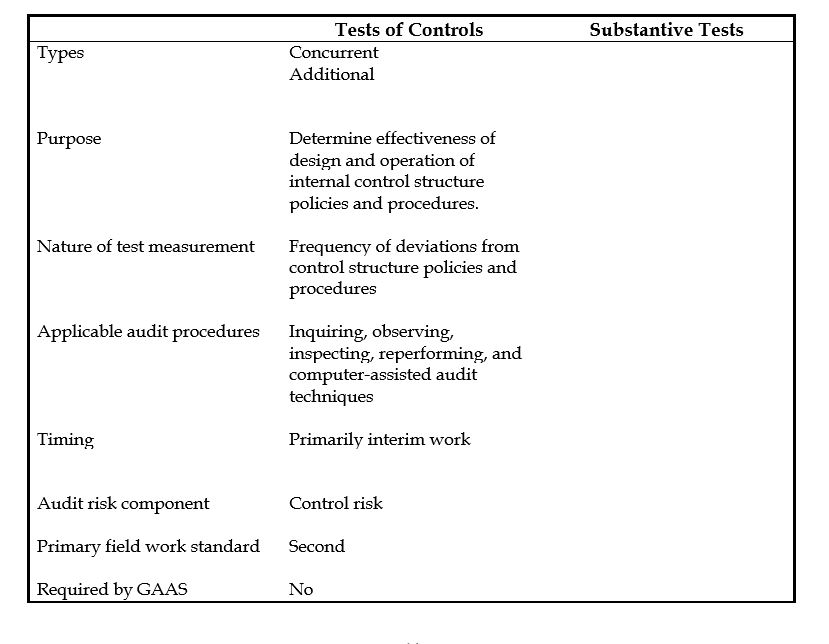Exam 12: Audit Procedures in Response to Assessed Risks: Substantive Tests
Exam 1: Auditing and the Public Accounting69 Questions
Exam 2: Financial Statement Audits and84 Questions
Exam 3: Professional Ethics86 Questions
Exam 4: Auditors Legal Liability67 Questions
Exam 5: Overview of the Audit Process49 Questions
Exam 6: Audit Evidence, Audit Objectives,71 Questions
Exam 7: Accepting the Engagement and56 Questions
Exam 8: Materiality Decisions and Performing Analytical Procedures47 Questions
Exam 9: Audit Risk, Including the Risk of Fraud44 Questions
Exam 10: Understanding Internal Controls91 Questions
Exam 11: Audit Procedures in Response to Assessed Risks: Tests of Controls18 Questions
Exam 12: Audit Procedures in Response to Assessed Risks: Substantive Tests82 Questions
Exam 13: Audit Sampling in Substantive Tests72 Questions
Exam 14: Auditing the Revenue Cycle72 Questions
Exam 15: Auditing the Expenditure Cycle80 Questions
Exam 16: Auditing the Production and81 Questions
Exam 17: Auditing the Investing and77 Questions
Exam 18: Auditing Investments and92 Questions
Exam 19: Completing the Audit and Postaudit102 Questions
Exam 20: Attest and Assurance Services, and Related Reports61 Questions
Exam 21: Internal, Operational, and103 Questions
Select questions type
The traditional audit focuses on the test of details of balances for income statement accounts rather than balance sheet accounts.
(True/False)
4.9/5  (33)
(33)
Substantive tests must be designed to tests specific audit objectives.
REQUIRED: For the following specific audit procedures, indicate the assertion that is being tested. Use the following letters, placing your response in the space provideD.
-Select vendor accounts with high activity during the year, and low balance at
year-end for confirmation.
(Multiple Choice)
4.7/5  (45)
(45)
Substantive tests must be designed to tests specific audit objectives.
REQUIRED: For the following specific audit procedures, indicate the assertion that is being tested. Use the following letters, placing your response in the space provideD.
-Examine check register for the month following year end for disbursements
relating to the audit period.
(Multiple Choice)
4.9/5  (31)
(31)
The decision on the part of the auditor to perform substantive tests during the interim period will be based upon:
(Multiple Choice)
4.8/5  (34)
(34)
Revision of the planned level of detection risk will be necessary whenever:
(Multiple Choice)
4.9/5  (40)
(40)
The balance sheet account Accounts Receivable is related to which one of the following income statement accounts?
(Multiple Choice)
4.8/5  (34)
(34)
Professional standards do not allow the performing of substantive audit procedures at an interim date.
(True/False)
4.9/5  (32)
(32)
Detection risk can be broken down into tests of controls risk and analytical procedures risk.
(True/False)
5.0/5  (41)
(41)
Under which set of circumstances may it not be necessary to perform tests of details?
(Multiple Choice)
4.8/5  (30)
(30)
Complete the summary of audit tests below by indicating the appropriate substantive tests information.

(Essay)
4.7/5  (35)
(35)
Tests of details of transactions generally use evidence from:
(Multiple Choice)
4.7/5  (31)
(31)
For some assertions, analytical procedures may be more effective in detecting misstatement than tests of detail.
(True/False)
4.8/5  (37)
(37)
Substantive tests must be designed to tests specific audit objectives.
REQUIRED: For the following specific audit procedures, indicate the assertion that is being tested. Use the following letters, placing your response in the space provideD.
-Examine consignment agreements.
(Multiple Choice)
5.0/5  (35)
(35)
In auditing identified related party transactions, the auditor is expected to determine whether a particular transaction would have occurred if the parties had not been related or what the exchange price and terms would have been.
(True/False)
4.8/5  (33)
(33)
When the acceptable level of detection risk for an assertion is low, the substantive tests will usually be performed at or near the balance sheet date.
(True/False)
4.8/5  (34)
(34)
The more homogeneous the population, the smaller the sample size should be.
(True/False)
4.8/5  (37)
(37)
Substantive tests must be designed to tests specific audit objectives.
REQUIRED: For the following specific audit procedures, indicate the assertion that is being tested. Use the following letters, placing your response in the space provideD.
-Select high dollar items from the perpetual inventory records for
inspection/counting during the physical inventory.
(Multiple Choice)
4.8/5  (37)
(37)
Substantive tests must be designed to tests specific audit objectives.
REQUIRED: For the following specific audit procedures, indicate the assertion that is being tested. Use the following letters, placing your response in the space provideD.
-Review bond indenture agreement and ascertain client compliance with any
restrictive covenants.
(Multiple Choice)
4.8/5  (41)
(41)
Showing 61 - 80 of 82
Filters
- Essay(0)
- Multiple Choice(0)
- Short Answer(0)
- True False(0)
- Matching(0)